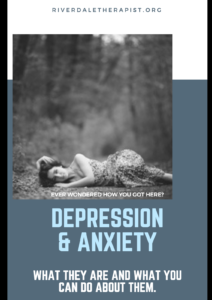
There is not a day that goes by that we are not impacted by the feelings of sadness and anxiety by ourselves or someone in our lives. We are living in a very stressful time with causes being personal and environmental such as climate change, political strife, and even getting decent food.
We are beginning to realize that we are manipulated in many ways that are detrimental to our mental and physical health. It is time to take back our individualism and personal initiative by making the changes that will give us a life well lived.
First of all, what is depression and what causes it? Clinical Depression is a mood disorder that may cause changes in brain function, including the altered activity of specific neural circuits in the brain. Possible causes include a combination of biological, psychological, and social sources of distress.
Leslie Korn has a different take on the causes of depression:
Depression is often an end-stage symptom of chronic stress.
Depression is also a disease that
arises from systemic inflamation. Chronic stress
disables the body’s capacity to successfully “quench
the fires” to fight inflamation. Inflamation affects
the first and second brain as cells called cytokines
block tryptophan conversion to serotonin.
The reference to the second brain is to our gut
also known as our enteric nervous system.
(Korn, Leslie , Nutrition Essentials for Mental Health pg 100)
Symptoms of depression can include the following:
Poor concentration
Overeating or undereating
Feelings of hopelessness and sadness
Tearfulness
Irritability
Poor sleep or oversleeping
Loss of interest
Body aches that do not improve
Suicidal thoughts
It is essential to get a full medical checkup to rule out any medical condition that may be causing these symptoms. For example, there is a correlation of some medical disorders with depression such as diabetes and heart disease.
What is Anxiety and what causes it?
There are various forms of anxiety such as Generalized Anxiety Disorder, Panic Disorder, PTSD, Acute Stress Disorder, and Obsessive Compulsive Disorder.
For the sake of this blog, I would describe general anxiety as a feeling of worry, nervousness or unease. There are physical changes that occur with anxiety such as increased blood pressure, rapid heartbeat, tingling in hands and feet, sweaty palms, lightheadedness, dizziness, headaches, upset stomach, body aches, poor sleep, hypervigilance, exaggerated startle response, teeth grinding, trembling, sweating, hot and cold body,
People with anxiety commonly have disordered
breathing and hyperventalation and somatic symptoms.
Low levels of magnesium are a marker for anxiety
as well as low levels of the neurotransmitter GABA.
(Korn, Leslie , Nutrition Essentials for Mental Health pg 102-103)
Now let’s move into how we can help ourselves to avoid or minimize depression and anxiety.
Sleep
The number one thing we can focus on is sleep. It is important to develop a routine so that we can improve our sleep. This might include taking a nightly bath, drinking herbal tea, relaxing yoga, meditation, and turning off all stimulation such as TV, iphone, and ipad at least two hours before going to bed. The bed is only for sleeping and sex so all other activities should be done outside of the bed. (This is tough for people living in a studio). Reading before going to bed can help to induce sleep as well as soft music. A banana has tryptophan in it so makes for a nightly snack.
Exercise
Neuroscientists are now saying that exercise can change the formation of the brain and it is the best anti-depressant around.
The key is to get into an exercise routine while your mood is stable so that you can continue when you are feeling depressed. Exercise will also decrease any anxious feelings you may be having. Using Yoga with people having the diagnosis of PTSD is beneficial.
In the next blog, we will cover Food as Medicine to prevent or alleviate the symptoms of depression and anxiety. You will be surprised at how easy it is to eat the right food.
